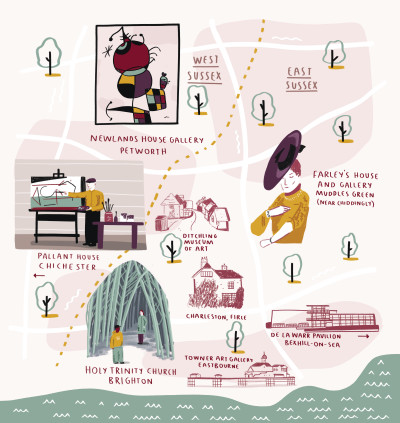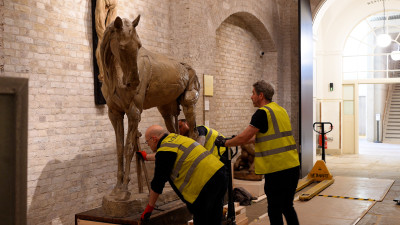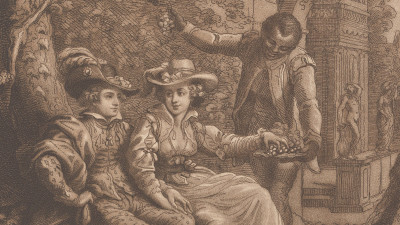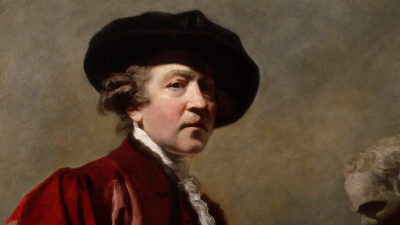
Eileen Agar RA, Collective Unconscious, 1977-8.
Acrylic on canvas. 1050 mm x 1020 mm. © The Artist's Estate. © Photo: Royal Academy of Arts, London. Photographer: John Hammond.
This image is not available to download. To licence this image for commercial purposes, contact our Picture Library at picturelibrary@royalacademy.org.uk
Collective Unconscious, 1977-8
Eileen Agar RA (1899 - 1991)
RA Collection: Art
In her autobiography A Look at my Life (1988), Eileen Agar said that as an artist 'one must have a hunger for new colour, new shapes and new possibilities of discovery'. The lyricism and vibrant colouring of Collective Unconscious is representative of her late work. The composition combines Surrealist elements with its abstracted "cut-out" forms and painterly surface. Although this painting refers to the unconscious in its title, Agar never practised the surrealist working method of ‘automatism’, the act of creating without conscious thought. Rather, Agar was inspired by ‘daytime dreams’, allowing her subconscious imagination to provide ideas for compositions like this.
Agar, whose preferred working method was collage, often incorporated "found object" within her paintings, drawings and sculptural pieces physically and as represented motifs. Her Diploma work is composed of forms derived from molluscs, shells, sea-anemones, seaweed and fossils. While living in Paris in the late 1920s, Agar regularly visited the Jardin des Plantes where she became fascinated by: 'the bones of the proto-bird, the Archaeopteryx, which I felt should be painted life-size. I was enthralled by fossils, their muted colour and embedded beauty. They reach us as signals in time, isolated objects which take on importance of a problem resolved at some moment far back beyond the mists of human memory.'
Born in Buenos Aires in 1899, Agar came to London aged six. She studied at the Slade School of Fine Art (1921-1924) before travelling to Paris and Spain with her first husband, Robin Bartlett. In 1926 Agar began a relationship with the Hungarian writer Joseph Bard, who she married in 1940. In 1929 she moved to Paris set up a studio and studied under Franti'ek Foltýn (1891-1976) who she said encouraged her to free herself 'from the cul-de-sac of representational painting, by learning the principles of abstract painting, and experimenting with colour as well as form.'
Agar was the only British artist to have work included in the International Surrealist Exhibition at the New Burlington Galleries in 1936. Although she is often categorised as a Surrealist, Agar was equally interested in abstraction and did not strictly adhere to the tenets of any particular art movement. Agar was elected a Senior Member of the Royal Academy in 1988.
Object details
1050 mm x 1020 mm
Start exploring the RA Collection
- Explore art works, paint-smeared palettes, scribbled letters and more...
- Artists and architects have run the RA for 250 years.
Our Collection is a record of them.



